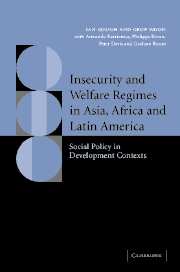 Insecurity and Welfare Regimes in Asia, Africa and Latin America
Insecurity and Welfare Regimes in Asia, Africa and Latin America Book contents
- Frontmatter
- Contents
- List of maps
- List of figures
- List of tables
- List of authors
- Acknowledgements
- List of abbreviations
- Glossary
- Introduction
- Part I Understanding insecurity and welfare regimes in the South: an analytical framework
- 1 Welfare regimes in development contexts : a global and regional analysis
- 2 Informal security regimes : the strength of relationships
- 3 Conceptualising in/security regimes
- Part II Regional regimes
- Part III Regimes in global context
- Conclusion : Rethinking social policy in development contexts
- References
- Index
3 - Conceptualising in/security regimes
Published online by Cambridge University Press: 04 August 2010
- Frontmatter
- Contents
- List of maps
- List of figures
- List of tables
- List of authors
- Acknowledgements
- List of abbreviations
- Glossary
- Introduction
- Part I Understanding insecurity and welfare regimes in the South: an analytical framework
- 1 Welfare regimes in development contexts : a global and regional analysis
- 2 Informal security regimes : the strength of relationships
- 3 Conceptualising in/security regimes
- Part II Regional regimes
- Part III Regimes in global context
- Conclusion : Rethinking social policy in development contexts
- References
- Index
Summary
Introduction
This chapter is one result of our dialogue between European social policy and the sociology of development. I was charged with the task of exploring how the concepts of ‘welfare regime’, ‘social exclusion’ and ‘social policy’ might be usefully adapted for understanding African realities in the context of a growing interest in the notion of ‘global social policy’ and the increasing merger of development and (military) security (Duffield 2001). My starting point was to ‘sensitise’ the welfare regime model to African realities using selected studies by political scientists, historians, social anthropologists and others working in the ‘African studies’ and development traditions. This process led to the design of a more abstract and encompassing model which I am calling the in/security regime model. This is an analytical model which identifies general mechanisms, processes and relationships to guide the collection and analysis of information in any empirical ‘welfare’ context. As explained below, the model can be used to explore and compare welfare regimes, informal security regimes and insecurity regimes (see chapter 1), and has a variety of other possible uses. In the concluding section of this chapter I use it in a brief examination of the global in/security regime mix.
It is important here to draw a distinction between (1) abstraction and (2) generalisation as a result of empirical comparison.
- Type
- Chapter
- Information
- Insecurity and Welfare Regimes in Asia, Africa and Latin AmericaSocial Policy in Development Contexts, pp. 88 - 118Publisher: Cambridge University PressPrint publication year: 2004
- 4
- Cited by


